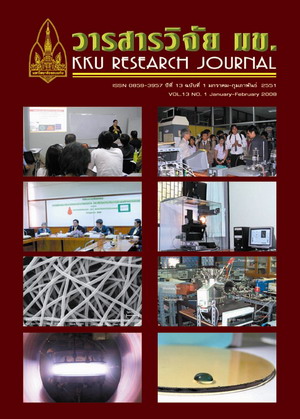Optimal protein level in artificial diet on growth for juvenile Babylone areolate link (Thai)
Main Article Content
Abstract
The aim of this study is to examine the optimal protein level in practical flake diet for growth of
juvenile babylone Babylonia areolata Link. Four practical diets 29, 38, 43 and 45 percent protein with 4138.48 kcal/kg gross energy had been test on one-month age babylone. Each rearing unit had 343 shell/m2 stocking density. Data collection on growth and survival rate had been conducted every twice week. The experimental period was 14 weeks. The result found that babylone fed diet containing 29 percent protein had significantly more average shell length, average shell width and average weight (P<0.05) than those fed diets
containing higher percent protein. All growth parameters for Babylone fed diet containing 38 percent protein
(P<0.05) were significantly higher than those fed diets containing 43 and 45 percent protein. At the end of the study, survival rate of babylone fed all diets had no significant differences (P>0.05). This study showed
that 29 percent protein in practical flake diet was the optimal protein level for growth of juvenile babylone
B.areolata
juvenile babylone Babylonia areolata Link. Four practical diets 29, 38, 43 and 45 percent protein with 4138.48 kcal/kg gross energy had been test on one-month age babylone. Each rearing unit had 343 shell/m2 stocking density. Data collection on growth and survival rate had been conducted every twice week. The experimental period was 14 weeks. The result found that babylone fed diet containing 29 percent protein had significantly more average shell length, average shell width and average weight (P<0.05) than those fed diets
containing higher percent protein. All growth parameters for Babylone fed diet containing 38 percent protein
(P<0.05) were significantly higher than those fed diets containing 43 and 45 percent protein. At the end of the study, survival rate of babylone fed all diets had no significant differences (P>0.05). This study showed
that 29 percent protein in practical flake diet was the optimal protein level for growth of juvenile babylone
B.areolata
Article Details
How to Cite
Paibulkichakul, C., Yothakong, T., & Paibulkichakul, B. (2017). Optimal protein level in artificial diet on growth for juvenile Babylone areolate link (Thai). Asia-Pacific Journal of Science and Technology, 13(1), 103–113. retrieved from https://so01.tci-thaijo.org/index.php/APST/article/view/83743
Section
Research Articles
References
-


